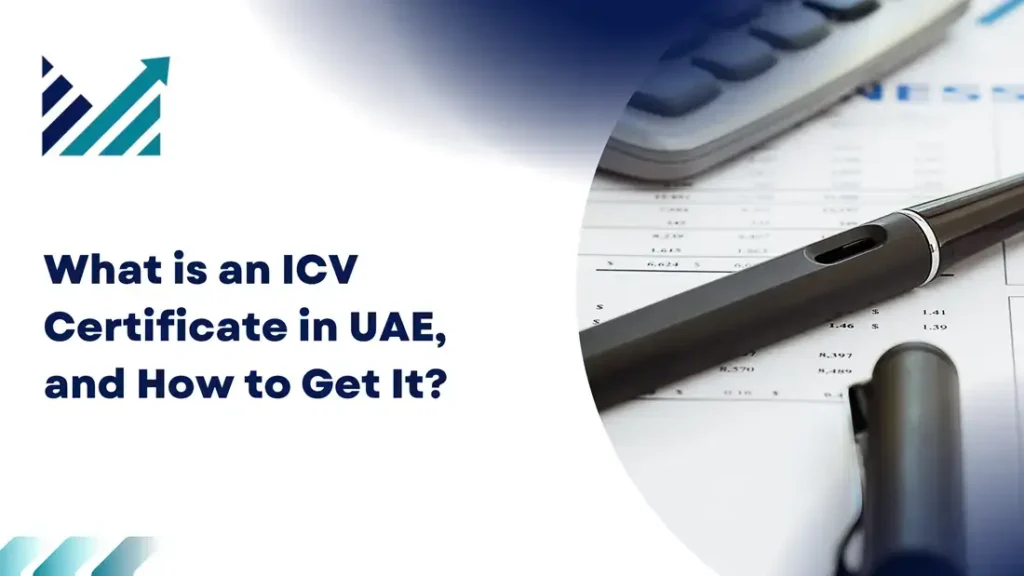
Doing business in the UAE means adapting to local policies that boost the national economy. One of these key initiatives is te In-Country Value (ICV) program, launched to strengthen the UAE’s industrial base, encourage Emiratisation, and support local suppliers.
In this guide, we’ll explain what an ICV certificate in UAE is, its benefits, how to get it, the required documents, and answer some common questions. By the end, you’ll know why this certification matters and how it can help your business compete and grow.
What is ICV Certificate in UAE?
An ICV certificate is an official document issued to companies operating in the UAE. It shows how much value your business adds to the local economy.
The certificate is part of the In-Country Value (ICV) Program, which started with ADNOC (Abu Dhabi National Oil Company) and later expanded under the UAE Ministry of Industry and Advanced Technology (MoIAT).
The main idea? Encourage businesses to:
- Buy goods and services locally
- Hire Emirati employees
- Invest in local assets
- Support exports
An ICV certificate measures all this in one score. The higher your ICV score, the more competitive your business becomes when bidding for government contracts and projects.
What is an In-Country Valuation Program?
The In-Country Valuation (ICV) Program was first introduced by ADNOC in Abu Dhabi. Its goal is to channel more procurement spending back into the UAE economy instead of going abroad.
Today, the program is overseen by MoIAT as part of the UAE’s wider plan to diversify its economy, attract foreign investment, and create jobs for Emiratis.
What are the Objectives of the ICV Program?
The ICV Program aims to:
Localize supply chains and boost new industries
Attract foreign investment and diversify income sources
Increase private sector contributions to GDP
Create valuable job opportunities for UAE nationals
Encourage exports beyond oil and gas
Drive sustainable, long-term economic growth
These objectives align with the UAE’s vision to become a global hub for industry, trade, and innovation.
Who Governs the ICV Program?
The program is supervised by the Ministry of Industry and Advanced Technology (MoIAT). Only auditors and certifying bodies approved by MoIAT can issue an ICV certificate.
You can find the official list of approved ICV certifying bodies on MoIAT’s website.
Advantages of ICV Certification
Let’s look at why getting an ICV certificate makes sense for businesses:
1. Competitive Edge in Tenders
Government entities and semi-government organizations often prefer suppliers with higher ICV scores. A better score improves your chance of winning tenders.
2. Enhanced Credibility
An ICV certificate shows you’re serious about supporting the UAE’s national goals. This can boost your reputation among clients, investors, and partners.
3. Access to Lucrative Opportunities
Many major projects, especially in oil & gas, construction, and manufacturing, require suppliers to have an ICV certificate.
4. Alignment with National Goals
By increasing your local spending, hiring Emiratis, and investing locally, you directly contribute to the UAE’s economic diversification.
5. Long-term Growth
ICV-certified companies are seen as sustainable partners who help strengthen the local economy.
Why Do Businesses Need ICV Certification?
Even though an ICV certificate isn’t mandatory, businesses choose to get certified because:
- It improves their eligibility to participate in government and semi-government projects.
- It supports Emiratisation, local procurement, and other national goals.
- It helps plan better strategies to increase their local contribution.
In many industries, especially oil & gas, energy, and large construction, an ICV certificate is almost expected to stay competitive.
Who Needs an ICV Certificate?
You should consider getting an ICV certificate if your business:
✔ Supplies goods or services to government entities
✔ Works with ADNOC, Etisalat, or similar public firms
✔ Wants to participate in UAE tenders
✔ Plans to align business goals with national initiatives
Is ICV Mandatory in the UAE?
Technically, no. The certificate is optional. But if you don’t have it, your ICV score will be considered zero when applying for tenders. This puts you at a big disadvantage against competitors with certified ICV scores.
Who Issues an ICV Certificate?
Only ICV certifying bodies approved by MoIAT can issue the certificate. These are typically auditing firms that have been trained and licensed to calculate and verify ICV scores.
What is the Eligibility Criteria to Obtain ICV Certification?
- To get certified, your business must:
- Have a valid trade license
- Operate a physical office in the UAE
- Fulfill specific industry requirements
- Complete an audit by a MoIAT-approved certifying body
What is the Validity of an ICV Certificate?
An ICV certificate is valid for 14 months from the date of your last audited financial statements. After expiry, you need to renew it to stay eligible for tenders and government contracts.
Benefits of ICV Certification
To recap, the benefits include:
- Better tender chances
- Stronger reputation and trust
- Support for national growth
- More government business opportunities
- Stronger local partnerships
- Contribution to Emiratisation and GDP growth
- Long-term business sustainability
Steps to Obtain ICV Certification
Here’s a step-by-step guide on how to get your ICV certificate:
Step 1: Register Your Business
Ensure your business is properly registered with UAE authorities.
Step 2: Gather Required Documents
Prepare documents like:
- Trade license
- Financial statements
- Employee list (with Emiratisation details)
- Asset details (machinery, land, buildings)
- Purchase invoices (local and foreign suppliers)
- Contracts and subcontracting records
Step 3: Assessment
A certifying body reviews these documents to assess your business operations.
Step 4: Calculate ICV Score
The auditor calculates your ICV score by looking at:
- Local procurement
- Emiratisation levels
- Asset investment
- Exports
- Subcontracting and operational expenses
Step 5: Receive Your Certificate
If everything meets the criteria, you’ll get your official ICV certificate.
Step 6: Stay Compliant
Maintain proper records and update your certification annually.
Documents Required for ICV Certificate
Here’s a checklist of documents usually needed:
- Valid trade license
- Latest audited financial statements
- Employee records and salary details
- Fixed asset register
- Purchase and subcontracting invoices
- Export revenue details
- Details of local and foreign procurement
Tip: The clearer and better organized your documents, the smoother the certification process.
Tips for Successful ICV Certificate Attestation
- Plan Early: Don’t wait until the last minute. Auditing and document review can take time.
- Work with Approved Auditors: Only MoIAT-approved certifiers can issue valid certificates.
- Organize Your Records: Clear, detailed records make the audit faster and more accurate.
- Increase Local Procurement: Prioritize buying from UAE suppliers.
- Focus on Emiratisation: Hire and train UAE nationals where possible.
- Invest Locally: Build or lease local facilities and buy equipment within the UAE.
How Long Does it Take to Obtain the Certificate?
Depending on business size and document readiness, it typically takes 3–15 days after submitting audited financial statements.
How is ICV Score Calculated?
The formula:
ICV Score (%) = (Total Local Contribution ÷ Total Revenue) × 100
Local contribution includes:
- Local procurement
- Emiratisation wages and training costs
- Local asset investments
- Export revenue
- Subcontracting with UAE-based firms
What are the Factors that Determine ICV Score?
Here’s a quick breakdown:
- Local Procurement: Buy more goods/services from UAE companies.
- Emiratisation: Hire and train more UAE nationals.
- Asset Investment: Invest in local factories, offices, and warehouses.
- Exports: Increase revenue from non-oil exports.
- Operating Costs: Spend more on UAE-based services and facilities.
- Subcontracting: Partner with UAE-based subcontractors.
How to Find the List of ICV Certifying Bodies in the UAE?
Visit MoIAT’s official website. They keep an updated list of all approved auditors and certifying bodies.
How Much Will the ICV Certificate Cost?
The cost varies by:
✔ Company size (SME or large business)
✔ Number of employees
✔ Annual revenue and complexity
✔ Type of business (industrial or commercial)
On average, certification may cost a few thousand dirhams, but exact fees depend on your business details and the chosen certifier.
Also Read: e-Invoicing in UAE
Frequently Asked Questions (FAQs) About ICV Certification in UAE
Is the ICV certificate mandatory?
No, it’s optional. But without it, your score is zero for tenders.
Who issues the certificate?
Only MoIAT-approved auditors.
How long is it valid?
14 months from your last audited financial statement.
Can SMEs get certified?
Yes. All UAE-registered businesses can apply, regardless of size.
What industries benefit most?
Oil & gas, construction, manufacturing, trading, logistics, and services.
Can I improve my ICV score?
Yes, by hiring Emiratis, buying locally, investing in UAE assets, and exporting more.
How long does it take?
About 3–15 days after submitting documents.
Final Thoughts
Securing an ICV certificate in the UAE isn’t just about paperwork—it’s about aligning your business strategy with the country’s vision for growth and diversification.
Companies with ICV certification gain access to better opportunities, build trust with clients, and help strengthen the UAE’s economy.
Ready to get certified? Work with an approved auditor, keep your documents in order, and focus on boosting your local contribution. It’s a smart step for long-term success in the UAE market.

